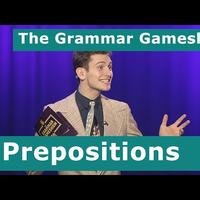19- Prepositions
Hello and welcome to today's Grammar Gameshow!
I'm your host, Will!
And Will,
I am!
And of course, let's not forget Leslie,
our all-knowing voice in the sky.
Hello, everyone!
Tonight we're going to ask you three questions about…
Prepositions.
Those little but oh-so-important words
for talking about movement, place and time!
OK! Now, let's meet our contestants!
Hello, all.
My name's Sully.
And contestant number two?
It's nice to meet you.
I'm Liz.
Welcome to the Grammar Gameshow both of you.
Enjoy the experience…
it could be your last.
Pardon?
I said, let's get going fast!
And there's nothing suspicious about that!
Our first round is a quick-fire round.
Prepositions are often used to connect sentences
with a time word.
I'm going to tell you a time word,
and I want to know the preposition.
Here goes!
Four o'clock.
At four o'clock.
Correct!
2016.
In 2016.
Correct!
Friday.
On Friday.
Correct!
Night.
At night.
Correct!
Morning.
In the morning.
Correct!
Christmas.
At Christmas.
Correct!
Leslie?
Excellent work!
There are three basic prepositions of time.
‘At' is used for times of the day,
for example, at four a.m.
‘On' is used for days
such as ‘on Sunday', or ‘on Christmas day'.
‘In' is used for periods,
such as months, years and seasons.
But be careful,
some times are irregular,
such as ‘at night'.
There's nothing irregular about
what you do at night, Leslie.
We've all occasionally cried in a ball on the floor…
every night, right Sully?
What are you trying to say?
Nothing!
You just look like the type.
What?
I said, make sure your answers are right!
And there's nothing suspicious about that.
Liz has six points,
but you only have three!
On to round two,
and this round is a picture round.
Look at the picture and tell me where each person is.
One point for every correct preposition.
He's in the pool.
Correct!
But he's also at the pool.
Also, correct!
His finger's in his nose.
Correct!
They're walking on the bridge.
Correct!
Leslie?
Good!
Prepositions are used to describe
the positions of things to other things.
Words like ‘in', ‘on', ‘at' , ‘over' and ‘between',
among others,
tell us where things are or where they are moving to.
Unfortunately, English has a lot of prepositions
which need to be learned.
So study hard!
Well done Liz.
You did best there so you can have another
four-and-a-half points.
How are you doing?
To be honest, I'm just really thrilled to be here.
I never thought I'd get to go onto a quiz programme!
Nor did we!
Especially with that face!
What?
I said, no more prepositions of place!
And there's nothing suspicious about that.
On to our third round.
Another group of prepositions is called
‘dependent prepositions'.
They are the ones which must follow a verb,
noun or adjective to connect them to a sentence.
Listen to these sentences
and tell me why each one is wrong.
She's always been good to speaking in public.
At.
Good at speaking in public.
Correct!
I take a lot of pride to working hard.
In.
Pride in working hard.
Correct!
You should never rely for other people.
On.
Rely on people.
Correct!
Leslie?
Good job!
Dependent prepositions are the prepositions which
follow a noun, verb or adjective
in order to connect it to a sentence.
‘Good at', ‘pride in', ‘rely on'.
Be careful though,
some words can have more than one preposition,
and the choice may determine the meaning.
And that brings us to the end of today's
Grammar Gameshow.
Let's count out the points…
and the winner is…
Liz with
points!
Well done! Here's what you've won!
It's a
thumbs up!
We'll see you again next week,
where you can play for another prize.
And Sully, you managed to answer quite a few questions,
which surprised me because when I first saw you,
I thought you were incredibly stupid!
What?
I said, I thought you were incredibly stupid!
Oh! Good!
That's what I thought you said.
Bye-bye.
Release the octopi!
It looks like we'll need another contestant.
Thanks for joining us.
Say goodbye, Leslie.
Au revoir, Leslie!
See you next time.

